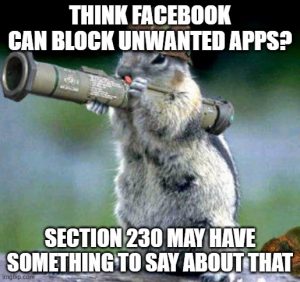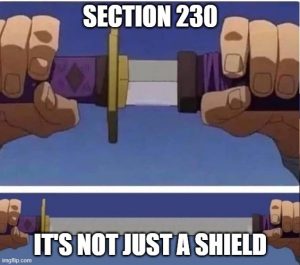Attempt to Weaponize Section 230(c)(2)(B) Fails on Ripeness Grounds–Zuckerman v. Facebook
 Ethan Zuckerman, a professor at UMass Amherst, wants to code and offer an app he calls Unfollow Everything 2.0, “which would automate the process of unfollowing friends, groups, and pages on a user’s Facebook social media profile.” Because he expects Facebook will block the app, he affirmatively sued Facebook claiming that it couldn’t block the app because the app will be protected by Section 230(c)(2)(B).
Ethan Zuckerman, a professor at UMass Amherst, wants to code and offer an app he calls Unfollow Everything 2.0, “which would automate the process of unfollowing friends, groups, and pages on a user’s Facebook social media profile.” Because he expects Facebook will block the app, he affirmatively sued Facebook claiming that it couldn’t block the app because the app will be protected by Section 230(c)(2)(B).
This is a kind of 4D chess move. The lawsuit attempts to turn Section 230(c)(2)(B) into a legal sword to restrict someone else’s discretion (including legal doctrines like trespass to chattels that normally are unaffected by Section 230) and essentially create a mandatory access right for third-party apps, rather than the statute’s more celebrated function as a liability immunity. As a result, this dispute implicates some provocative Internet Law questions.
The court reaches none of those questions. Instead, the court succinctly says that the case isn’t ripe, so Zuckerman is requesting an unconstitutional advisory opinion. The court says that because the app isn’t coded yet, there’s “uncertainty in how the tool will ultimately be coded, by what technical means it will interact with Facebook, and how long the venture will take…. The absence of a meaningful prototype or functional code distinguishes Unfollow Everything 2.0 from” various precedential cases. In other words:
the dispute must be about this tool, not a tool. Professor Zuckerman, or his investors, want an opinion on legality before they invest further resources into Unfollow Everything 2.0. Federal courts do not, and cannot, exist to give advisory opinions to assist investment decisions.
The court also says it wouldn’t exercise its discretion to hear the dispute even if it had such discretion:
were Professor Zuckerman to prevail, the Court would have to cabin a declaratory relief order based on contingent facts—such as, whether Unfollow Everything 2.0 would be built to x specification or function in y capacity, or whether z provision of the Meta Terms of Service would be implicated. Such guesswork runs counter to the benefit of finality offered by the judiciary.
For now, all of the interesting 4D chess issues will have to wait. However, I doubt this ruling is the final word in the case.
Case Citation: Zuckerman v. Meta Platforms, Inc., 2024 WL 4876949 (N.D. Cal. Nov. 22, 2024)
___
Because of the high-profile nature of this lawsuit, I received several reporter inquiries about the case. This is the statement I sent to reporters about the complaint filing:


